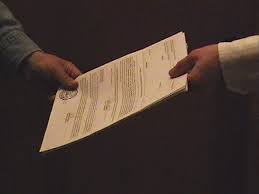 What is Process?
What is Process?
According to Cornell Law School, a process is a set or collection of documents relevant to a specific court case that are to be served to the defendant(s) named in the case. These papers often include a court summons and the complaint as filed by the plaintiff. When a process is for a witness or other person, the process may include a summons and subpoena.
What is Service of Process?
Cornell states that service of process is the process by which defendants named in court proceedings are given adequate notice of those upcoming court dates. This is related to due process as mentioned in the 14th and 5th amendments of the U.S. Constitution. Due process ensures people have adequate time to prepare for a legal case against them.
What is a Process Server?
A process server is an individual that delivers the court paperwork to the defendant(s) named in the case. Some states require that process servers be approved by the courts and/or local law enforcement and must complete mandatory education and examination, among other requirements. In other states, anyone over 18 years old that is not a named party in the case may serve the papers. Here in Tallahassee, the process for becoming a process server is governed by Florida’s 2nd Judicial Circuit.
What Types of Papers Do Process Servers Deliver?
Process servers deliver documents for all types of cases, including:
This is not an exhaustive list of documents we deliver. Process servers can also deliver documents that aren’t of a legal nature.
Why Can’t I Serve My Own Court Papers?
Florida requires that anyone serving process in this state must be either a law enforcement officer or a properly certified/approved/appointed private process server in the area where they work. Individuals are not allowed to serve process in any case in which they are in any way affiliated, even if they are a properly certified process server.
The mailing process is also not an option in Florida unless approved by a judge prior to mailing. The mailing process does not satisfy the Due Process requirement in the U.S. Constitution. In-person service must be attempted several times before alternative service such as mailing is considered.
Who Can Be a Process Server?
Florida’s 2nd Judicial Circuit sets the rules for who can be a process server in Tallahassee and surrounding areas as follows:
- Be at least 18 years of age at the time of application
- Have no mental or legal disability
- Be a permanent resident of the State of Florida
- Attest that they have read the statutes, case law, and rules governing service of process
- Take and pass a written examination
- Complete a background check
- File a Certificate of Good Conduct
- Take an oath of office
- Post a surety bond
- Submit recommendation letters from all county Sheriffs in the 2nd circuit
What are Process Servers Permitted to Do to Find a Process Recipient?
Process servers can use various means to locate their intended recipient. They may:
- Go to the recipient’s residence.
- Go to the recipient’s workplace.
- Go to the recipient’s school.
- Call the recipient.
- Go to any place they believe the recipient may be found.
- Use online resources such as social media.
- After court approval, give the process to a third party or publish it in the local newspaper.
What are Process Servers Not Allowed to Do While Attempting Service?
Process servers in Florida may NOT:
- Serve process in any case in which they are personally invested.
- Serve process on a Sunday.
- Serve process in any area where they are not certified/approved/appointed.
- Touch the recipient’s mailbox or mail slot.
- Wear a disguise or lie about who they are.
- Use drugs or alcohol while serving process.
- Visit the recipient’s workplace without first notifying the employer.
- If the recipient is self-employed, visit the place of business outside of regular business hours.
- Make threats.
- Use offensive or vulgar language.
- Physically contact the recipient.
- Accept tips or bribes.
- Be behind on their child support payments.
- Avoid service of process themselves.
- Do anything that a judge deems negligent, malfeasant, or incompetent.
Process Servers in Tallahassee
As you can see, process servers in Tallahassee must meet high standards. For the most professional process servers in Leon County, trust the experts at Accurate Serve®. We have the knowledge and resources necessary to serve process in your case quickly, efficiently, and discreetly if needed. Call us at (850) 519-5494 or send us a work request online.





